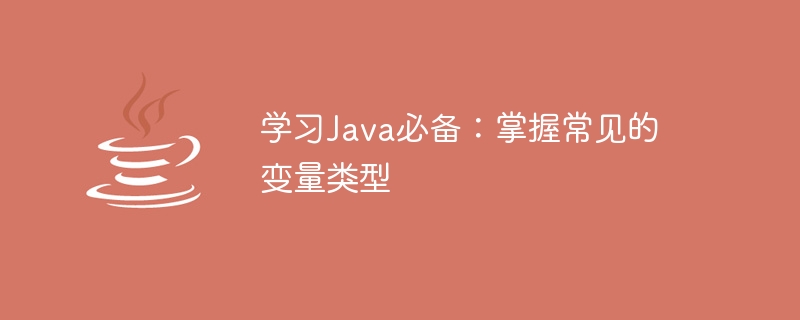Home >Java >javaTutorial >Must-read for getting started with Java: Proficient in common data types
Must-read for getting started with Java: Proficient in common data types
- WBOYWBOYWBOYWBOYWBOYWBOYWBOYWBOYWBOYWBOYWBOYWBOYWBOriginal
- 2024-02-18 15:14:07607browse

Essential for learning Java: Master common variable types
Overview
In Java programming, variables are a very important concept, they can store Various types of data and can be modified during the execution of the program. Understanding common variable types is the basis for learning Java programming. This article will introduce common variable types in Java and how to use them.
- Basic data types
The basic data types in Java include integer types, floating point types, character types and Boolean types. They are the most basic data types and are used to store various basic data values.
1.1 Integer type
Integer types include byte, short, int and long, which are used to store integer values in different ranges. For example, the byte type can store integers between -128 and 127, while the int type can store integers between -2147483648 and 2147483647. You can use the following syntax to declare variables of integer type:
int num = 10;
1.2 Floating point type
Floating point types include float and double, which are used to store values with The numerical value of the decimal point. The float type can store about 7 decimal digits, while the double type can store about 16 decimal digits. You can use the following syntax to declare variables of floating point type:
double num = 3.14;
1.3 Character type
Character type char is used to store single characters, such as letters and numbers. or special characters. Character type variables can be declared using the following syntax:
char ch = 'A';
1.4 Boolean type
The Boolean type boolean can only store two values: true and false. It is often used to express the truth or falsehood of a condition. Variables of Boolean type can be declared using the following syntax:
boolean flag = true;
- Reference data types
In addition to basic data types, Java also provides There are some reference data types used to store references to objects. Among them, common reference data types include strings, arrays, and classes.
2.1 String
A string is composed of a series of characters and is used to store text data. In Java, you can use the String class to represent and manipulate strings. You can use the following syntax to declare variables of string type:
String str = "Hello";
2.2 Array
An array is a container in which multiple identical type of element. In Java, you can use arrays to store a set of data. Variables of array type can be declared using the following syntax:
int[] nums = {1, 2, 3, 4, 5};
2.3 Class
Class is Java A core concept in programming that defines the properties and behavior of objects. You can use defined classes as variable types and create objects to store data. For example, you can create a class named Student and use it as a variable type to store the data of the student object:
Student student = new Student();
Summary
Mastering common variable types is the basis for learning Java programming. This article introduces common variable types in Java, including basic data types and reference data types. Basic data types include integer types, floating point types, character types, and Boolean types, while reference data types include strings, arrays, and classes. Familiarity with the declaration and use of these variable types will help you write fully functional and reliable Java programs. I hope this article can be helpful to friends who are learning Java programming!
The above is the detailed content of Must-read for getting started with Java: Proficient in common data types. For more information, please follow other related articles on the PHP Chinese website!

